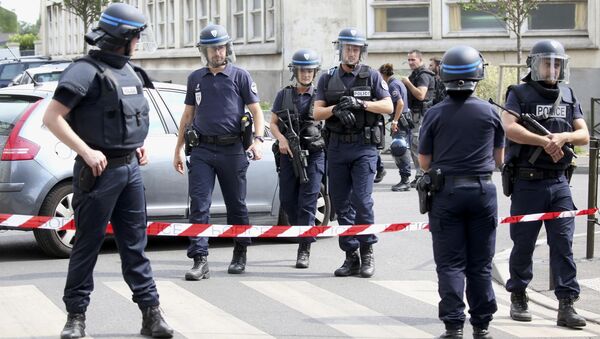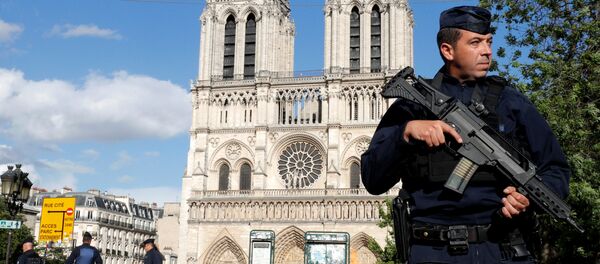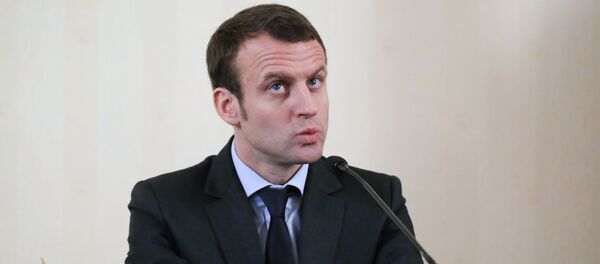PARI (Sputnik) – Earlier on Tuesday, the French lower house passed in the first reading a bill on combating terrorism. The legislation stipulates, in particular, the strengthening of administrative authority, which will simplify the issuance of search warrants, and will also allow temporary closures of places of religious worship where propaganda of hatred and violence is conducted.
The legislation, which has yet to undergo further approvals to come into force, incorporates some elements of the French state of emergency set to expire on November 1, which was prolonged six times since the Paris terror attacks of 2015.
FREEDOMS OF FRENCH COMPROMISED
Jean-Pierre Maulny, deputy director of the French Institute for International and Strategic Affairs (IRIS), told Sputnik that the legislation passed by French parliamentarians compromises the longstanding French tradition of freedom.
"This worries all the freedom protection bodies, who are asking 'aren't we finally just alienating our freedoms in the sake of an illusory security?' That is the question. And after all, it is not possible to prolong the state of emergency every six months. It could last for ten years, if you want," Maulny said, suggesting that instead, such an anti-terror law must be reevaluated after certain periods of time.
Maulny added that is was difficult to say if the new legislation would be efficient or yield a good result in combating terrorism on a daily basis.
"It does not mean that the law is useless, but thinking that it will regulate things at this level is an illusion," the expert pointed out.
Francois-Bernard Huyghe, an IRIS research director specializing in radicalization and terrorism, also said that he had concerns about this legislation as it can "limit the freedom of expression, or touch upon private life."
Huyghe also doubted that the law would be effective if implemented.
"If we take some recent cases, we would see that in the case of gas bombs found in Paris for example, one of the suspects was known to authorities as radicalized. It proves one thing: we have so many radicalized people, thousands of "fiche S" [listed by authorities as threatening national security], we cannot put them all under surveillance. Often we discover after an attack that there was a person marked "fiche S" involved. In the case of the attack in Marseille the anti-terror law would have changed nothing," Huyghe explained.
Huyghe added that the new legislation was criticized by both right-wing political powers as there was always room for additional measures, and by the left-wing forces and NGOs, which characterized it as a measure of installing excessive control over citizens.
Over the past thirty years, some 20 laws against terrorism have been adopted in France, but they all proved useless, the expert pointed out.
"This is a law of compromise and equilibrium, which is not seen by the majority of those involved in the fight against terrorism as something they are favorable of. What is in there, basically, is an augmentation of things that already existed, allowing to more easily close the Salafist places of worship, to more easily fix the places of residence of suspected jihadists, have more ID control, to assure better protection of big sportive and cultural events," the expert noted.
ACTION NEEDED TO COMBAT TERRORISM
Maulny said that the everyday work of the authorities could prevent people from radicalization.
"We need to act in all spheres, there is no exclusive field of action, it is not only about security," Maulny pointed out.
Huyghe, in turn, also called for active measures to be taken to combat terrorism in France.
Apart from this, Huyghe called for coordination between the French anti-terrorism and intelligence structures and similar EU and international agencies.
"This is the priority so that it is not in the moment of a terror attack that we find out that the suspect was already intercepted in Belgium or Italy before. There is no point in piling the layers of articles of the penal code," Huyghe said.
In the expert’s opinion, the authorities also need to have a counter-discourse to fight the jihadist ideology, organize informational attacks on jihadist networks and spread false messages. However, such actions would be difficult to implement in a democratic state.





